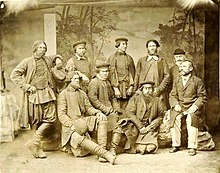Molocans
The Molokans ( Russian Молокане / Molokane ; Armenian Մոլոկաններ / Molokanner ; Azerbaijani Molokanlar ; Turkish Malakanlar ), translated milk drinkers because they on the fast days milk consume, are a community of spiritual Christianity , which differs from the Russian Orthodox Church has separated . Similar split-off movements are the Duchoborzen and the Subbotniken .
From an Orthodox point of view, the Molokans are friendly to Protestants and only allow the Bible to be used for their way of life. You see yourself in the imitation of early Christianity . During their services, neither a priest conducts the ceremony, nor are icons allowed, instead the members of the respective congregation sit in a circle around the elders and sing songs together in praise of God.
Today's communities date from the second half of the 18th century. The heyday of the community falls around the years 1820 to 1830, when its main area of influence was on the central Volga . From 1830 they had to emigrate to the south of the Caucasus according to a plan of the tsarist government . The goal was to expel religiously “renegade” Russians from the central regions of Russia and at the same time to settle ethnic Russians in Transcaucasia . Even today there are some Molokan-inhabited villages in Armenia and Azerbaijan .
After the Russo-Ottoman War between 1877 and 1878 , the Molokans were also resettled in Kars , which had been conquered by Russia and returned to Turkey after the First World War . From here, most emigrated to the United States and Australia in the mid-20th century . After the pogroms against the Greek population of Istanbul in 1955, hostilities against the Molokans broke out in Kars, which led the remaining small minority to emigrate to Russian Stavropol in 1962. A few Molokans still live in Kars and Istanbul today .
Molokans in Azerbaijan
According to different estimates, 2,000 to 3,000 Molokans live in the Azerbaijani village of Ivanovka today. The village of Ivanovka was founded in 1837 by Ivan Perschin, who, along with other Molokans, was exiled to Transcaucasia according to the ukase of Nikolai I. In 1932 a collective farm called kolkhoz was established in Ivanovka. The Ivanovka kolkhoz is the only preserved type of administration in the whole Republic of Azerbaijan. The village has a tractor and car depot, asphalt plants, farms for cattle, sheep, poultry and pigs, as well as milk and oil producers. There is also a large bakery, three farms and a host of other shops in the village. There are two guest houses in the village, there is a large cultural palace including a concert hall with a capacity for 700 visitors.
See also
literature
- Aram Haytian: The Molokans in Armenia. In: Iran & the Caucasus, Volume 11, No. 1, 2007, pp. 33-44
Web links
- Garik Galstyan: The last Russians in Armenia. In: Caucaz.com. April 24, 2006, archived from the original on November 19, 2006 .
- Andrew Donskov, Ethel Dunn, Liudmila Gladkova (Eds.): A Molokan's Search for Truth: The Correspondence of Leo Tolstoy with Fedor Zheltov (Желтов Федор Алексеевич Scheltow). (English).
- Spiritual Christians Around the World. In: molokane.org. (English).
- Andrei Conovaloff: Taxonomy of 3 Spiritual Christian groups: Molokane, Pryguny and Dukh-i-zhizniki - books, fellowship, holidays, prophets and songs. In: molokane.org. April 25, 2020 (English).
- Asif Masimov: Molokans: Past and Present. In: masimovasif.net. 1st October 2019 .
- Mesut Çevikalp: Molokan community still exists in Kars despite decreasing number. In: Today's Zaman. July 8, 2012, archived from the original on March 5, 2016 .
Individual evidence
- ↑ Asif Masimov: Molokans: Past and Present. In: masimovasif.net. October 1, 2019, accessed May 16, 2020 .
